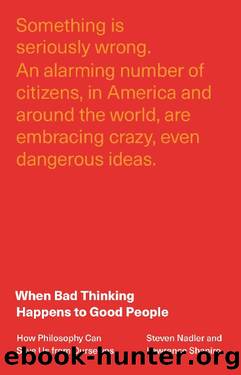When Bad Thinking Happens to Good People by Steven Nadler & Lawrence Shapiro

Author:Steven Nadler & Lawrence Shapiro [Nadler, Steven]
Language: eng
Format: epub
ISBN: 9780691212760
Publisher: Princeton University Press
Published: 2021-08-30T16:00:00+00:00
Chapter 4
When Bad Thinking Becomes Bad Behavior
The ancient Greek poet Archilochus, in a parable popularized by the philosopher and intellectual historian Isaiah Berlin, said âthe fox knows many things, but the hedgehog knows one big thing.â1 Before the academic professionalization of philosophy in the nineteenth century, philosophers tended to be foxes. Rather than specializing in one area or anotherâmetaphysics, epistemology, ethicsâthinkers such as Plato, Aristotle, Aquinas, Descartes, Spinoza, Leibniz, Hume, and Kant, among so many others, took on all the big questions.
Among those quintessential philosophical topicsâWhat is reality? What is knowledge? What is a good life?âthere is the one about human nature itself: What is it to be a human being? Plato, ignorant of kangaroos, suggested that we are essentially featherless bipedal animals.2 Aristotle, on the other hand, located our essence in the capacity to reason. He said that to be human is to be a rational animal, although he also famously claimed that âman is by nature a political animal,â moved instinctively to organize with others into society.3
Putting this metaphysical debate about âessenceâ aside, we can say with certainty that human beings are moral animalsâor, to put it better, âmoral agents.â We are, by our natureâand barring any relevant disabilitiesâendowed with the capacity of deliberation over action in the light of principles and values. When we choose to do something because, after thoughtful reflection, we believe it to be the right thing to do (or avoid it because we believe it to be the wrong thing to do), we are behaving as moral agents. But we are also exercising that fundamental human capacity when we choose to do something despite our seeing that it is the wrong thing to do, and even when we do it because we see that it is the wrong thing to do. As long as our action is deliberately chosen and informed, for better or for worse, by beliefs about principles and values that we understand and acknowledgeâregardless of what those principles and values happen to beâwe are acting as moral agents. The Nazi is no less a moral agent than the Good Samaritan.
Unfortunately, there are many ways for this process of thoughtful, informed practical reasoning to break down or go awry. As the Nazi example shows, exercising our moral agency to the fullest does not imply that we act well or do the right thing, or even that we intend to act well or do the right thing. But, more to the point, neither do we always exercise our moral capacities to the fullest. Even with the best of intentions, we can end up doing what, were we thinking properly and thinking well, we would notâand perhaps should notâdo. We now know that good people, because of bad thinking, can be epistemically at fault; they often believe things without adequate justification. But good people, because of a different sort of bad thinking, can also do bad things. Perhaps more often, good people, because of bad thinking, simply fail to do a good thing.
Download
This site does not store any files on its server. We only index and link to content provided by other sites. Please contact the content providers to delete copyright contents if any and email us, we'll remove relevant links or contents immediately.
Professional Troublemaker by Luvvie Ajayi Jones(29650)
Whiskey Words & a Shovel I by r.h. Sin(19389)
Rewire Your Anxious Brain by Catherine M. Pittman(18643)
Healthy Aging For Dummies by Brent Agin & Sharon Perkins RN(17037)
Cat's cradle by Kurt Vonnegut(15334)
Talking to Strangers by Malcolm Gladwell(13346)
The Art of Thinking Clearly by Rolf Dobelli(10451)
They Both Die at the End by Adam Silvera(9807)
The 5 Love Languages: The Secret to Love That Lasts by Gary Chapman(9784)
Doing It: Let's Talk About Sex... by Hannah Witton(9275)
The Compound Effect by Darren Hardy(8942)
Thirteen Reasons Why by Jay Asher(8893)
Goodbye, Things by Fumio Sasaki(8575)
Wonder by R.J. Palacio(8569)
Tools of Titans by Timothy Ferriss(8365)
Atomic Habits: Tiny Changes, Remarkable Results by James Clear(8326)
Becoming Supernatural by Dr. Joe Dispenza(8199)
Wonder by R. J. Palacio(8097)
Change Your Questions, Change Your Life by Marilee Adams(7758)
